News
NCC Boss to Receive Vanguard’s Regulator of the Year Award on Friday

The Executive Vice Chairman and Chief Executive of the Nigerian Communications Commission (NCC), Prof. Umar Danbatta, is set to receive the 2022 Regulator of the Year Award at the highly-coveted Vanguard Personality of the Year Awards.
KANO FOCUS reports that Vanguard Newspaper Limited, the organizers of the event, has said that Danbatta would receive the award category at a ceremony to be held in Lagos on Friday, January 27, 2022 based on the recognition of the professor’s transformational and inspiring leadership, which brought the effective regulatory regime in the telecoms sector, impacting positively on Nigeria’s digital economy ecosystem.
A statement sent to KANO FOCUS by Director, Public Affairs Reuben Muoka said alongside other prominent personalities including state governors like Babagana Zulum of Borno State, Ifeanyi Okowa of Delta State, Abdulraham Abdulrazaq of Kwara, Udom Emmanuel of Akwa Ibom and Seyi Makinde of Oyo State as well as the Chairman of Dangote Group, Alhaji Aliko Dangote, and other Nigerians who have distinguished themselves in professional excellence and service to humanity, Danbatta will stand tall before Nigerians on Friday to receive his category of award.

Profoundly described as Africa’s Regulatory model, Prof. Danbatta has become a model to other African regulators.
A respectable scholar and distinguished academic, Danbatta has displayed a no-nonsense mien in discharging regulatory functions, yet he is generally viewed in the industry as a calm and calculative leader who takes fair but firm decisions in his drive to steady the Nigerian telecom environment. This has, no doubt, inspired many African regulators to adopt Nigeria’s model in order to revamp their regulatory activities.
A professor of telecommunications engineering, Danbatta, before his appointment, had been the Acting Vice Chancellor at the Kano State University of Science and Technology (KUST), and as a lecturer he has supervised more than 60 PhD, M.Eng and B.Eng projects in diverse areas of telecommunications.
Danbatta, however, was not entirely new to the industry before he bacame the NCC boss, as he had a stint at the Digital Bridge Institute (DBI) an international centre for advanced communications studies established in 2004 by the NCC for capacity building in diverse areas of Information and Communication Technology as the Vice President of the institute.
His first five years in office witnessed an effective regulatory regime through cutting-edge initiatives, strengthening the role of the telecommunications sector as a major contributor to the Gross Domestic Product (GDP).
Currently leading the charge to achieve the Nigerian National Broad Plan 2020-2025, Danbatta was acclaimed for spearheading the predecessor campaign, which Nigeria attained and surpassed the 30% national target in 2018, from paltry 6% when he took over.
The multiple award-winning professor also midwifed a highly successful 5G spectrum auction last year, while his strides in reviving the Emergency Communications Centers (ECCs) and the introduction of harmonized national emergency communication number (112) helped the NCC to win the International Public Relations Association Golden Award in the year 2021, because of a pivotal role they played in containing the COVID-19 pandemic.
His stellar leadership style was recently rewarded by the organizers of the prestigious Zik Prize, as they bestowed on him the Zik Prize award for Professional Leadership.
Danbatta earned BEng, MSc degrees from the Technical University of Wroclaw in Poland and received his PhD from the University of Manchester Institute of Science and Technology. Yet, in spite of his towering achievements, Prof. Umar Garba Danbatta, remains an epitome of modesty and humility.

Headlines
AGILE partners ICEADA in promoting girls education in 6 Kano LGAs
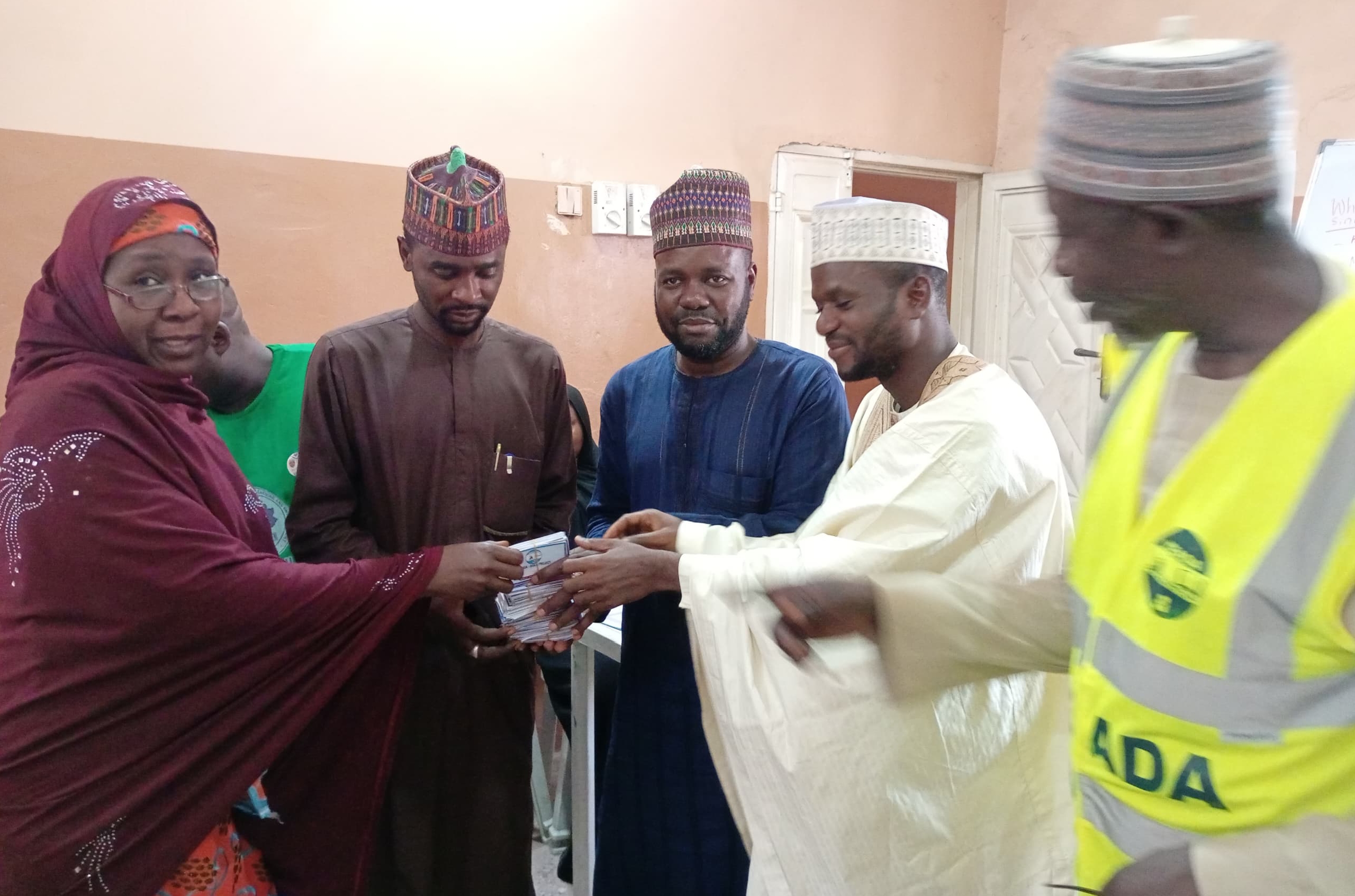
Aminu Abdullahi
The ICEADA AGILE partnership, aimed at promoting girls’ education at the grassroots level, has organized an Activity Feedback Workshop and Quarterly Meeting to assess the successes and challenges of the project across six local government areas in Kano State.
KANO FOCUS reports that the local governments areas include: Bebeji, Kiru, Karaye, Madobi, Rogo, and Warawa.

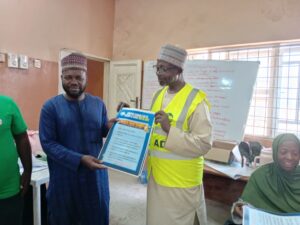
Prof M. B Shittu presenting IEC materials to Nasiru Yusuf Ibrahim
Speaking at the event, Prof. M.B. Shitu, Team Leader and Project Manager, explained that the project was designed to engage key stakeholders in the selected local government areas to sensitize communities on the importance of enrolling girls in school.
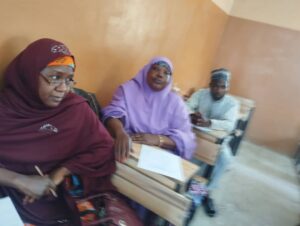
Cross section of ICEADA/AGILE mentors
He noted that participants of the workshop are Community Engagement Mentors selected from the six local governments.
“Their role is to engage directly with community members to promote girls’ enrollment in schools,” he said.
“Part of their responsibility is to carry out sensitization and mobilization campaigns within their communities. Our main concern is increasing the enrollment and retention of girls in secondary education. That’s why we introduced the Community Engagement Mentors—to collaborate with parents and local organizations in support of girls’ education,” Prof. Shitu added.
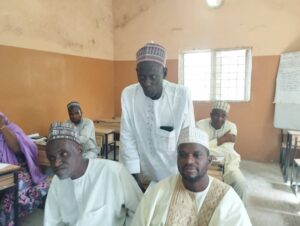
Cross section of ICEADA/AGILE mentors
He also revealed that the project has recorded significant progress across the six LGAs, although a few challenges still persist and are currently being addressed.
“One of the aims of this workshop is to review the activities carried out in the last quarter and set new community goals to strengthen our campaign. We’ve also launched house-to-house awareness campaigns to tackle the issues affecting girls’ education in these communities,” he stated.
Participants expressed satisfaction with the project’s progress. Lami Idris, a Community Mentor from Karaye LGA, shared her experience.
“We are going from house to house to educate people on the benefits of girls’ education. One of the major challenges we face is the lack of schools in some villages. Some girls have to walk long distances to reach school,” she said.
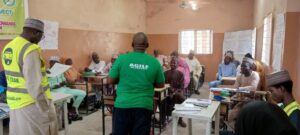
Review meeting in session
Abdullahi Balarabe Kiru, Secretary of the Nigeria Union of Teachers (NUT) in Kiru LGA, reported that data collected from the area showed over 40 girls are currently out of school. He affirmed that efforts are ongoing to address the issue.
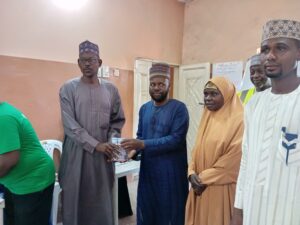
Nasiru Yusuf Ibrahim presenting IEC materials to community mentors
In his remarks, Malam Nasiru Yusuf Ibrahim, Communication Officer of the AGILE Project, disclosed that 130 new schools will be constructed in Kano State to tackle the problem of out-of-school children.
He also highlighted insecurity and the destruction of school infrastructure as major challenges facing the education sector.

Headlines
Governor Yusuf Distributes 10,000 Free JAMB Forms to Secondary Students

The Governor of Kano State, Alhaji Abba Kabir Yusuf, has inaugurated the distribution of 10,000 free JAMB forms to Kano secondary school students.
During the flag-off of the distribution, the Governor, who was represented by the state’s Commissioner of Education, Ali Haruna Makoda, also used the opportunity to inaugurate the training of the 10,000 beneficiaries on the use of computer-based tests at various designated centers across Kano State.
On his part, the Governor’s Special Adviser on Education, Alhaji Tajuddin Gambo, said the Governor has promised to provide transport for the beneficiaries throughout the training session and urged them to ensure they pass the examination.
He said the government is willing to select the best schools for the beneficiaries if they pass the examinations.
One of the beneficiaries of the 10,000 free JAMB forms, Fatima Mukhtar Umar, expressed gratitude to Governor Abba Kabir Yusuf for issuing the free JAMB forms and promised not to disappoint.

In a statement by Governor Abba Kabir Yusuf’s Special Adviser on Information, Ibrahim Adam, it was noted that the Governor used the opportunity to elaborate on the feats achieved by his government in developing the education sector in the last 22 months. These include the re-introduction of foreign and domestic scholarships, re-opening of 21 skills acquisition institutes, general renovation of primary and secondary schools, construction of new classrooms, provision of classroom furniture and writing materials, and the distribution of free uniforms to primary school pupils.
Other achievements, according to the Governor’s Special Adviser on Information, Ibrahim Adam, include the reduction of 50% of registration fees in state-owned tertiary institutions, cash conditional transfers to support girl-child education, and the settlement of registration fees for NECO, NABTEB, and NBAIS, to mention but a few.
Ibrahim Adam said Governor Abba Kabir Yusuf urged all the beneficiary students to make the best use of the opportunity and strive for excellence in their academic pursuits, saying that the future belongs to those who work tirelessly to turn dreams into realities.

Headlines
Exposed: Coercion Over Coalition?: Youth Forum Reveals Presidency’s Desperate Moves on Kwankwaso
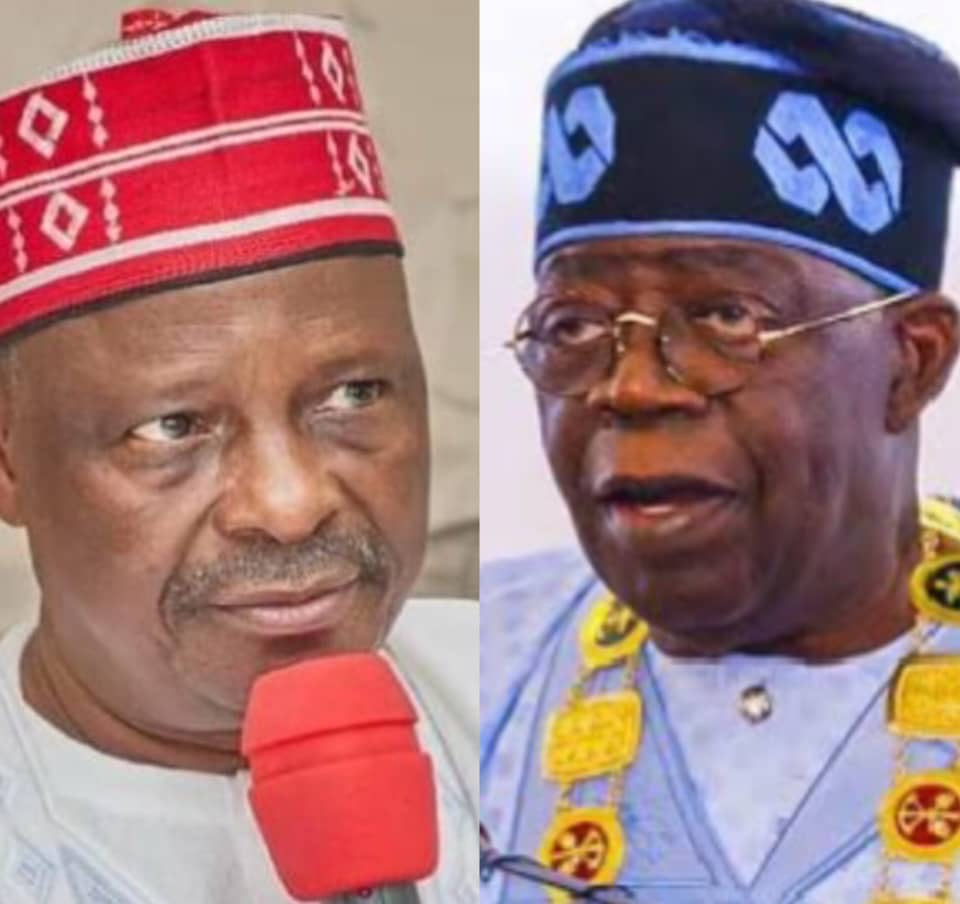
A political storm is brewing as the Coalition of Northern Youth Forum (CNYF), under the leadership of Alhasan Barau Gausu, has raised alarm over what it describes as desperate and undemocratic moves by the Presidency to force Dr. Rabiu Musa Kwankwaso, the national leader of the New Nigeria Peoples Party (NNPP), into joining the ruling All Progressives Congress (APC).
According to the group, the Tinubu-led administration is leveraging state institutions, particularly the Economic and Financial Crimes Commission (EFCC), to intimidate and coerce Kwankwaso into defecting to the ruling APC.
Central to the allegations is a revived petition detailing a 2016 contract worth N15.5 billion, awarded through the Federal Ministry of Water Resources to a company reportedly linked to one of Kwankwaso’s closest allies—a known financier of the Kwankwasiyya Movement.
The EFCC reportedly invited the contractor for interrogation last week Tuesday.

The CNYF claims that the contractor is being pressured to implicate Kwankwaso in the alleged financial misconduct, suggesting the anti-graft agency is being used as a political weapon to break the opposition.
“This is nothing short of blackmail,” said Gausu. “They want to silence Kwankwaso’s rising political influence and force him into a weak alliance with the ruling party, using fear and intimidation.”
The group further disclosed that a high-powered delegation from the Presidency, led by a former Katsina State governor—now serving as TETFUND board chairman—recently visited Kwankwaso at his Abuja residence, appealing to him to join the APC.
However, sources say Kwankwaso responded with firm conditions for any possible defection.
These include:
• A reduction in the price of Premium Motor Spirit (PMS)
• Massive reinvestment in Nigeria’s education sector
• Reintroduction of the Almajiri Model Education System (originally implemented during President Jonathan’s administration)
• His appointment as Secretary to the Government of the Federation (SGF)
Allocation of three ministerial slots to his political associates from northwest, northeast and south-south.
Without these demands being met, Kwankwaso reportedly stated he would remain with the NNPP—or align with the emerging SDP coalition, being championed by Atiku Abubakar and Nasir El-Rufai.
The fallout from this meeting, according to the CNYF, may have prompted APC National Chairman Abdullahi Ganduje’s recent public declaration that Kwankwaso would soon rejoin the APC.
Speaking during a visit by the Tinubu Support Group (TSG) to the APC national secretariat, Ganduje boldly claimed, “NNPP is dead,” insinuating that its leader was on the verge of returning to the ruling party.
Analysts believe the APC’s desperation stems from Kwankwaso’s undeniable grassroots influence in the Northwest—especially Kano State, which boasts over two million registered voters.
With growing public discontent over the removal of fuel subsidy and other economic policies, the Tinubu administration appears to be seeking strong political alliances ahead of 2027.
But for now, Kwankwaso remains unbowed, standing firm on his conditions and signaling that the NNPP—and its ideals—are not for sale.
Recently, the national and Kano state chapter of the APC were directed by the powrful forces from the villa to galvanize support and provide receptive atmosphere to recieve Kwankwaso and his teaming supporters back to APC.













